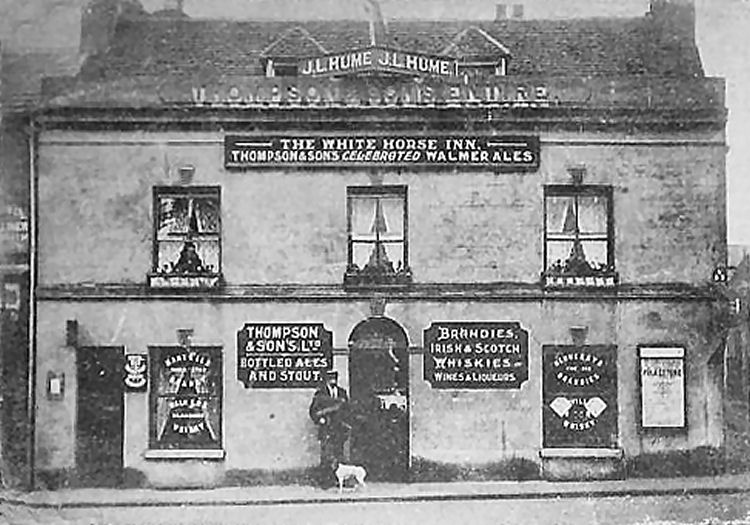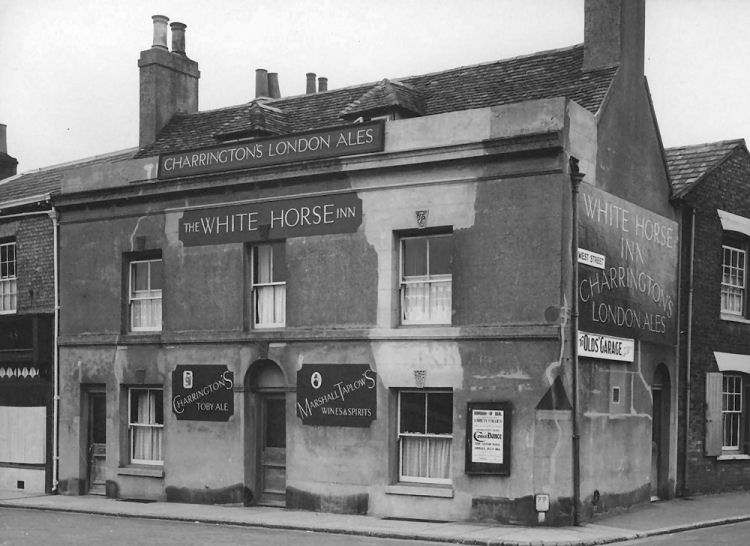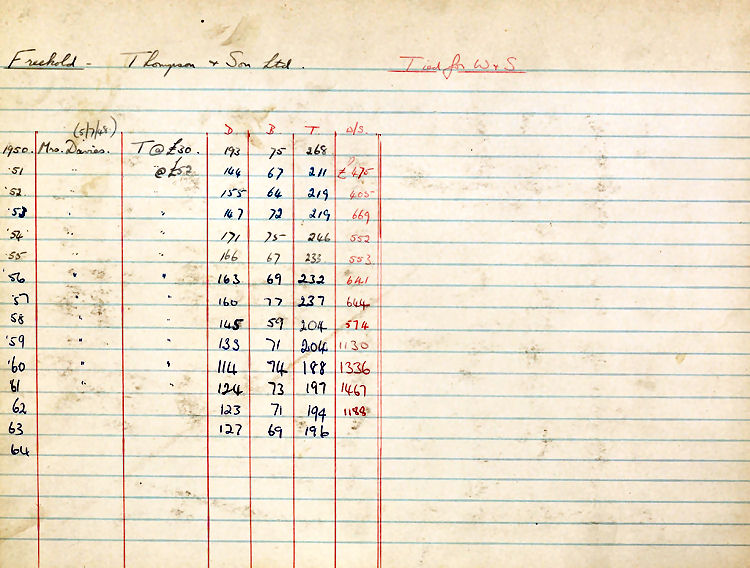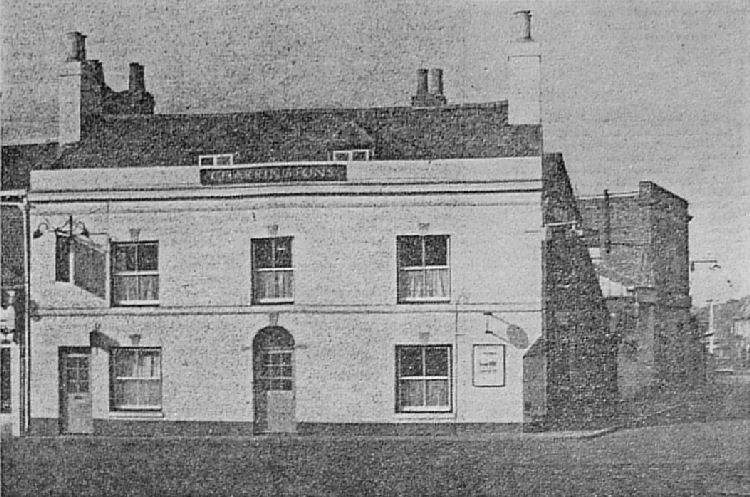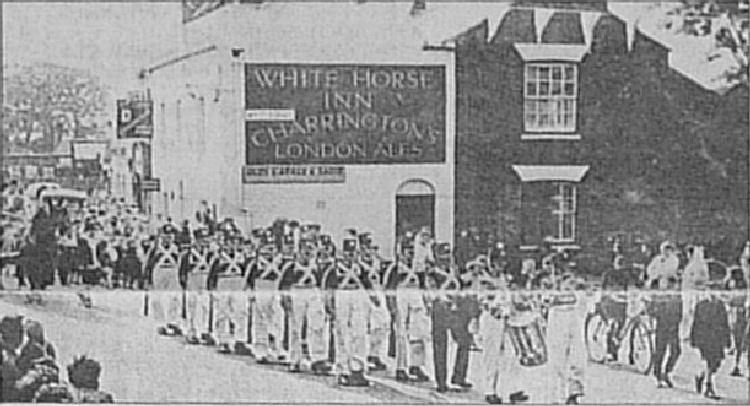|
46 Queen Street
1 Upper Queen Street/Middle Street
Deal
Earliest mention found to date was from the Kentish Post of January 5-8
1757 when the paper advertised:- "Auction Sale of a Messuage or Tenement at
the "White Horse" in Deal on 10th January 1757. November 1763 saw
the same pub up for sale again and evidently after some new buildings were
added:- "To be sold by auction 21st November 1763, a good-accustomed Tavern,
commonly called the "White Horse," situated near the Market Place in the
town of Deal, and now in the occupation of Simon Reynolds, a great part
whereof is a new building."
Mentioned by name only from the Deal Licensing Records of 1828, and as a
beerhouse in Bagshaws 1847 under the rule of William Redman, who according
to records at the same year held the license of the "Beehive"
at number 4 Queen Street.
|
Kentish Chronicles, 25 March, 1794.
Died.
On Saturday last died, at Deal, Mrs. Coleman, wife of Mr. John
Coleman, master of the "White Horse" at that place.
|
|
Kent Gazette Reports 27 December 1805.
DEATH.
Friday, at Deal, aged 80, Mr. John Miles, formerly master of the
"White Horse Inn."
|
|
Kentish Gazette, 16 June 1820.
DEATH.
June 14, at Wingham , Mr. Addisell, hair-dresser, late landlord of
the "White Horse," Deal.
|
|
From the New Handbook to Deal, Walmer and Sandwich &
their environs by James Phippen. 1852.
Advertisement.
"Richard Orrick - "White Horse Inn" near the Railway Terminus.
Licensed to hire Open and Close Carriages. Net and Commodious Gigs,
Clarences, Landsus. A pair horse Omnibus, etc.
On the most reasonable terms, Post and Saddle horses to let. Orders
sent to the "White Horse" at No. 13 Middle Street will meet with
immediate attention."
|
|
South Eastern Gazette, 11 December, 1860.
Petty sessions, Wednesday. (Before the Mayor, W. Nethersole and E.
Brown, Esqrs.)
Charles Williams, landlord of the "Rising Sun" public-house, was
charged with an assault on John Macey, on Tuesday, the 4th inst.
Complainant stated that on his return home from work about 5 o’clock
on Tuesday, he found the defendant the worse for liquor at his
house, the "Bricklayers’ Arms," West-street. He began to interfere
with witness, who told him to leave off, and tried to pacify him.
After that Williams’s mother came in with her eye cut, and said "I
have got my arm broken." Witness asked her about it, and while so
doing defendant came up and struck him twice on the nose with his
fist, on seeing which a witness named Bowles rushed forward and got
him away.
Defendant then left, but soon returned, when he began to strip, and
became very violent, tearing off his clothes and breaking things
around him. He was then given into custody. Complainant’s wife’s
mother is also prisoner’s mother.
George Bowles stated that he was at the "Bricklayers’ Arms" when Macey came home. Saw Williams strike Macey with his fist. Williams
then got him down, and heard him say he would do so again. Witness
then pulled him away and went to call the doctor for defendant’s
mother.
Defendant was again charged with assaulting Martha Graham, wife of
Richard Graham, labourer. Complainant deposed that at about 5
o’clock on Tuesday afternoon she was going home with some potatoes,
when Williams came out of the "White Horse," and said "Who are you."
She hurried on and did not answer, and after repeating the question
several times, he abused her in the grossest terms. Witness tried to
run away, but defendant soon overtook her and kicked and knocked her
down in the street. She screamed "Murder," and went into Macey’s
house, but said nothing whatever to defendant.
Defendant, who said he was very drunk and did not know what he was
doing, was sentenced to pay £2 and 7s. 6d. costs for the assault on
Macey, and to 21 days' hard labour for the assault on Mrs. Graham.
The fine was paid.
|
|
From the Deal Mercury, 9 December, 1865.
DEAL POLICE COURT
A DRUNKEN MENDICANT.
George Brown, a cosmopolite, was charged with soliciting alms in
Queen Street. P.C. Horton said that on the previous night, about ten
o'clock, he saw the defendant go into the "White Horse" public-house,
and ask for relief. He was drunk at the time, and when he came out
witness kept his eye upon him, and noticed that he entered the "Swan
Inn," also for the purpose of begging. He was taken into custody, and
when searched at the police-office 1s. 4d. in coppers was found upon
him.
Defendant, who said he had no money when he came into Deal, was
ordered to be imprisoned for 7 days, with hard labour.
|
|
From the Deal, Walmer, and Sandwich Mercury,
4 February, 1871. 1d.
ASSAULTING A WIFE
James Thomas Strivens was charged with having, on the previous day,
assaulted his wife, Hannah Strivens.
James Strivens deposed: I live at the "White Horse Inn," and my son
and his wife live there also. Yesterday afternoon my son struck his
wife. I did not see the blow, but I heard it, and went to her
immediately, and then he abused me. I afterwards had him apprehended, as
I find it is getting too bad. He was neither drunk nor sober at the
time. (The witness was about to tell the Magistrates the particulars of
an assault committed by the prisoner upon himself, but was informed that
they could only hear evidence as to the case before them.)
Hannah Strivens deposed that she was the wife of the prisoner, and
that on the previous afternoon, whilst they were sitting in the bar
parlour, he struck her in the head. They had previously had some words
together about his drinking.
Fanny Prescott, servant, corroborated the last witness, who, she
said, gave her husband no provocation.
In cross-examination by the prisoner, the witness said the blow was
given in anger, and that she had not seen the elder Mr. Strivens in the
bedroom with the prisoner's wife that day.
Prisoner said he had observed certain unpleasant things between his
father and his wife, and because he spoke about it they both bore
animosity against him. his wife and been "nagging" at him all day, but
he only struck her in a skylarking manner. He did not strike her at all
hard, and when the superintendent came to apprehend him they were
sitting at tea chatting together quite comfortably. His father had got
all his money, but he had a home to go to at Ramsgate, but his wife
would not leave the "White Horse." He believed there was a conspiracy
between his father and his wife to get him away.
In answer to the Magistrates, the wife said she was willing to go
home if her husband would treat her well. Her father-in-law first
suggested that her husband should be taken up, and she consented to it.
Supt. Parker having confirmed the prisoner's statement as to his
being seated comfortably at tea when he went to apprehend him.
The magistrates dismissed the case, thinking there were faults on
both sides, and informed the father that he had done wrong in having a
warrant issued when a summons would have done quite as well.
|
|
From the Deal, Walmer and Sandwich Mercury, 17 May 1873.
DEATHS
REDMAN. -- May 12, at the "White Horse Inn," Deal, Mr. Robert E.
Redman, aged 64 years.
(Not sure at this stage whether he was
licensee or not. P Skelton)
|
|
From the Deal, Walmer and Sandwich Mercury, 5 May 1900.
1d.
LICENSING
Mr. W. J. Solomon applied for a temporary permission to carry on the
business of the "White Horse," on behalf of Mrs. G. R. Mitchell,
executrix under the Will of her late husband, and the magistrates
granted a new license.
|
|
From the Deal, Walmer, and Sandwich Mercury,
7 July, 1900. 1d.
A DRUNKEN DRIVER
Samuel Barton was charged with being drunk while in charge of a horse
and cart on the 29th June.
Defendant pleaded not guilty.
P.C. Chapman deposed that at about half-past two the previous
afternoon he was on duty in Bowling Green Road, coming towards London
Road, when he heard the sound of a cart coming from the direction of
Upper Deal towards Deal, and heard someone shouting and swearing at the
pony. He hurried along to see who it was, and defendant passed him in
London Road, just before he got to the end of Bowling Green Road.
Defendant was shouting and shaking the reins of the pony, and swaying to
and fro in the cart. When witness got into London Road a gentleman on a
bicycle met him, and seeing him looking at the defendant, witness asked
him what was the matter with him. He replied, "He is drunk, policeman."
Another gentleman came along in a pony and cart, and witness got up with
him and drove behind defendant, who was driving all over the road; in
fact, the pony seemed to know the better way of going than defendant
did. The pony had to walk up a railway bridge, and he caught defendant
up by the "White Horse." He had a little child about three years of age
in the cart, screaming. he asked defendant to get down, and he saw he
was drunk, and told him he should charge him. defendant then told him
that it was he (witness) who was drunk, and not himself. He brought him
to the Police-station and locked him up.
Asked if he had any questions to put to the witness, defendant
attempted to deny the truth of the constable's evidence, and asserted
among other things that he was not drunk, and that P.C. Chapman came out
of the "White Horse" to stop him, and that that was the first he saw of
him.
Police-Sergt. Barnes said that he was at the Police-station when
defendant was brought in by P.C. Chapman. He was very drunk and was most
abusive. Defendant had given a great deal of trouble to the police. He
was wanted a short time ago to be served with a summons from the Ashford
Division. He did not answer to it, and a warrant was issued. He paid the
fine on that occasion. he had also a summons in the Elham Division, and
he owed20s. to that Division on that account. In both cases he was
charged with highway offences.
The Mayor said that defendant would have to undergo 21 days' hard
labour. He had disputed what the constable had said, but it was
perfectly correct, for he was an eye-witness of his behaviour himself.
|
|
From the Deal, Walmer, and Sandwich Mercury,
11 August, 1900. 1d
A £5 NOTE FOR A BROKEN COLLAR BONE
Dixon v. Curling & Bing
Samuel Dixon sued Walter Curling and Alfred Bing for £5 for "breaking
his collar-bone."
Plaintiff deposed that at 11 p.m. on the 23rd June he came out of the
"White Horse," Queen Street, and was going home, when Curling and Bing
stopped him and said "If you don't want to fight we will make you,"
following up this remark by immediately knocking him down and breaking
his collar-bone, and not content with this they struck him three or four
times after his bone was broken, and he was on the ground. Both
defendants were a little in liquor, but neither of them was drunk.
The Judge: And you?
Plaintiff: I was in it a little, too, of course, but not much.
No one came up to interfere, and there were no police about.
The Judge: What. No police?
After he had lain on the ground a little time, Dr. Hulke's coachman
came up, and took and tied the bone up and took him to the doctor. The
coachman was outside the "White Horse" at the time, but was not with the
doctor's carriage. The doctor set the bone and told him to come again
the next morning, which he did, and altogether he was laid up six weeks
"come tomorrow night," and was not able to work yet. He had seen both
defendants since this occurrence. On the 1st July he called upon them
and asked what they proposed to do in the matter, saying "My landlady
wants something to keep me, and the doctor wants paying," and they
agreed to pay him 10s. a week while he was laid up, and the doctor's
bill, but they had not paid anything, so he had put it into Court. he
did not call upon them to inform them of his intention to take legal
proceedings; in fact, he had had no communication with them since July
1st, and had not seen them since, until that morning.
Mr. Nightingale, brother-in-law of plaintiff, deposed to calling upon
defendants the morning after the assault, with a view to coming to an
agreement with them, as they did not want to take the case to the
police-court. They offered to pay plaintiff 10s. a week between them
(5s. each), and to bring the money to him (witness). But they had not
done so, hence these proceedings. (Laughter).
Alfred Bing, one of the defendants, said plaintiff was entirely to
blame. He was the cause of the row, "and me and Mr. Curling only acted
in self-defence." (Laughter). The row started over a song plaintiff had
sung in the "White Horse," and when they got outside plaintiff knocked
Mr. Curling down first. Mr. Curling got up to defend himself, and broke
Mr. Dixon's collar-bone. (Laughter). He (witness) did nothing. He did
not hit plaintiff. He went away and left Curling and Dixon there. Mr.
Nightingale came round to them the following morning (Sunday), and
wanted them to pay 5s. each. They said they would see how it went on in
a week. They did not go round to see plaintiff; the expected plaintiff
to come round to see them. (Laughter).
The Judge said there would be judgement for plaintiff for £5, to be
paid 10s. a week.
Bing: We can't pay 10s. a week.
The Judge: You shouldn't get drunk and break a man's collar-bone
then.
|
|
From the Dover Mercury Now and Then 16 September 2010.
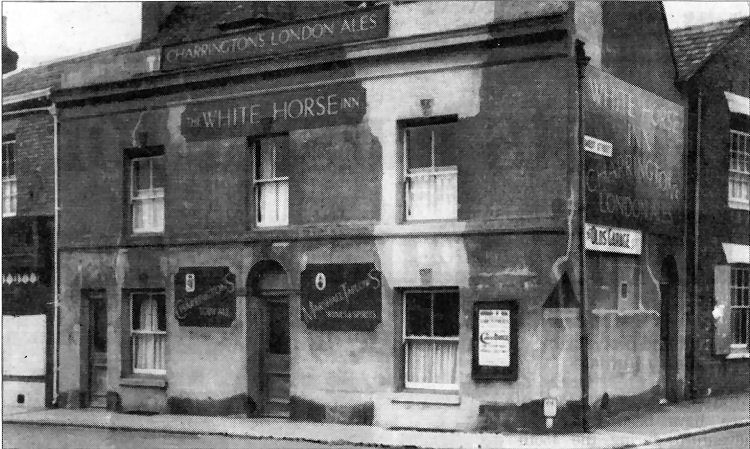
The long-gone White Horse Inn, pictures in the mid 1950s, which was
demolished to make way for road improvements.
MRS D AND HER GENEROUS MEASURES
AS DRIVERS negotiate the busy five-junction traffic lights in Queen
Street they may not realise a pub once stood on the corner next to the
garden centre.
The White Horse Inn closed in 1967 and was demolished in
August 1968 to make way for road improvements.
It stood on the right
hand corner of West Street and Queen Street, on the approach to Deal
Railway Station.
Mrs Davis, known to customers as Mrs D, ran the pub in
1944 (sic) and
was at The White Horse until it finally closed.
One teenager who was a customer in the 1960s remembered it as a homely place, stained by too many
cigarettes.
Mrs D was apparently known for her generosity, especially
when measuring drinks from spirit bottles. She used to turn to the
customer and ask: "Is that enough?" She was apparently quite happy to
put more in and charge the usual price.
Many pubs then were owned by
breweries, which probably did not keep track of occasional generous
measures.
Mrs D used to have a regular called Nobby, who collected empty glasses
for her. As a reward she gave him a port and after too many he often
burst into song.
John Castle was registered as innkeeper of an unnamed
beer house on the site in 1847, followed by a Richard Orrick in 1849 who
gained a full licence that year.
The railway had only arrived in Deal a
few years before so Mr Castle offered carriages for hire and saddled
horses to probably
offer to the new travellers.
In the 1930s the pub was threatened with
demolition 'to enable improvements to a dangerous area for traffic'. It
was given a reprieve, until 1967.
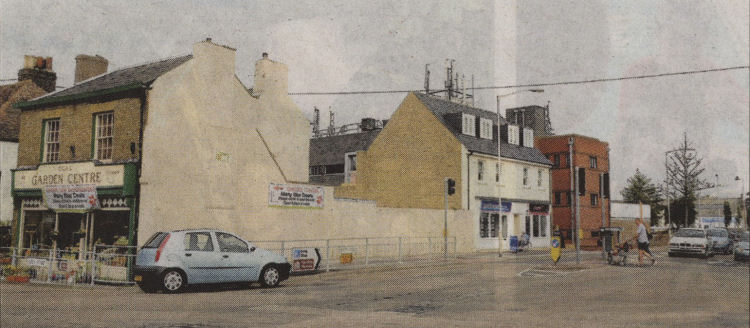
The busy five-junction traffic lights in Queen Street, Deal, today
(2010) where The
White Horse Inn once stood.
|
LICENSEE LIST
REYNOLDS Simon 1757-63
 COLEMAN John 1790-94+
COLEMAN John 1790-94+
MILES John ????
ATTERSELL/ADDISELL Sam (also hair-dresser) 1804-14/June/20 dec'd
CASTLE John 1847+
 beerhouse
beerhouse
ORRICK Richard B 1849-52+

QUICK Richard 1851+ (Deal census) (probably spelling error)
ORRICK Sarah 1858+

BUTT Henry 1861-62+ (age 42 in 1861 ) )

PHILLIPS J H 1869+

REDMAN William Wilkins 1871-95+ (age 45 in1891 ) )
    
WITHALL George 1898+
MITCHELL George Robert 1897-May/1900

MITCHELL Mrs Sarah Ann (G R) May/1900

 TAYLOR Henry May/1900-04+
TAYLOR Henry May/1900-04+
   
WALKER George Henry 1908+

HUME James (Charles) L 1913-22+
   
HUNT Bert James 1926+
YOUNG Frederick Charles May/1931-39+ (age 60 in 1939)
  
DAVIS Mrs 5/July/1948-67

https://pubwiki.co.uk/WhiteHorse.shtml
 From Bagshaw Directory 1847 From Bagshaw Directory 1847
 From Melville's Directory 1858 From Melville's Directory 1858
 From the Kelly's Directory 1862 From the Kelly's Directory 1862
 From the Post Office Directory 1874 From the Post Office Directory 1874
 From the Kelly's Directory 1874 From the Kelly's Directory 1874
 From the Post Office Directory 1882 From the Post Office Directory 1882
 From the Post Office Directory 1891 From the Post Office Directory 1891
 From the Kelly's Directory 1899 From the Kelly's Directory 1899
 From the Post Office Directory 1903 From the Post Office Directory 1903
 From the Kelly's Directory 1903 From the Kelly's Directory 1903
 From the Post Office Directory 1913 From the Post Office Directory 1913
 Deal Library List 1914 Deal Library List 1914
 From the Post Office Directory 1922 From the Post Office Directory 1922
 From the Kelly's Directory 1934 From the Kelly's Directory 1934
 From the Post Office Directory 1938 From the Post Office Directory 1938
 Deal Licensing Register Deal Licensing Register
 The Old Pubs of Deal and Walmer by Glover and Rogers The Old Pubs of Deal and Walmer by Glover and Rogers
|
